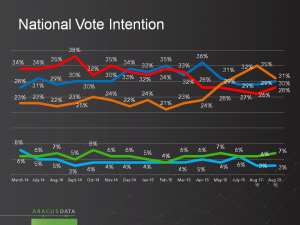KCCCC Day 31: it’s the economy, duh
- It’s the economy, stupid, per Carville. And the economy looks not so good, this morning. See assorted pundits here and here and here and here. Worrying news stories here and here and here and here and here.
- All that bad news has a political effect, eventually. And, increasingly, it looks like the Conservatives’ principal political opponent may not be the NDP or the LPC – it may be day after day of bad economic headlines.
- Does that all matter, though?Per the cliche, isn’t it true that only campaigns matter? Well, in recent years, a small but influential number of university professors have asserted that, well, campaigns don’t really matter at all. People make up their minds about voting choices based on things over which political consultants have no control, they say.
- For example: some of these professors have developed mathematical models to track changes in personal income, gross domestic product, and so on, and then predicted campaign winners based upon economic results. Not policy, and certainly not hardball campaign strategy. GDP.
- One of the better-known members of the “campaigns don’t matter” school is the much-quoted James E. Campbell, at the State University of New York at Buffalo. He’s a smart guy. Campbell asserts that, as far as he and like-minded thinkers are concerned, the economy is the answer to every question.
- Numbers and data assembled by Campbell shows the following: since the Second World War, in eight out of the ten presidential elections where the United States has enjoyed annual GDP of at least 2.5 percent, the incumbent has won. The two exceptions, he allows, were Democrat Hubert H. Humphrey in 1968, whose candidacy was battered by the ongoing Vietnam War, and the Republicans’ Gerald R. Ford in 1976, who was the target of anger for the sins of Watergate and the pardon of Richard Nixon. Until somewhat recently, Campbell was attracting a lot of academic converts.
- But. But but but. George W. Bush won when the Clinton/Gore economy had been going well. Stephen Harper won in 2008 just before a cataclysmic global recession – and won a majority when we were barely out of one, in 2011. The economy, therefore, is a question but it may not be the question.
- What do you think? Is this thing over already, due to the sagging economy? Or will the best campaign prevail?








